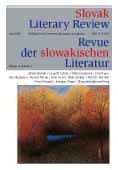

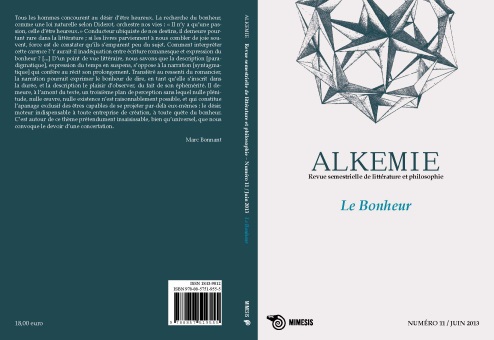
Keywords: exile; fragmentary; independence; neocolony; militant literature
Mongo Beti has nearly 48 years of literary writing. 1953, with the release of Sans haine et sans amour, until 2001, with Branle-bas en noir et blanc, the novelist seems to have kept a consistent scriptural made him a champion of African Francophone literary activism. How comes concretely related writing Mongo Beti? What are the stakes in his long career as a novelist?
More...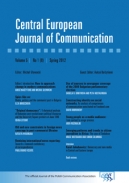
Keywords: identity; communication; social networks; network analysis; Facebook
Tendencies of mediatization, globalization, commercialization etc. in modern societies cause a loss of relevance of traditional agencies of socialization. Individuals are increasingly challenged to enfold their socialization on their own. Media products become highly relevant for an individual’s socialization. To be able to manage the demands of socialization, the individual needs to develop sophisticated competences of communication. The competences of communication enable the individual to identify and reflect his/her personal needs. Identity is conceived as the realization of an individual’s competence of construction of communication in interactive situations. Online social networks such as Facebook.com provide spaces of communication, in which individuals can work on their identity in processes of interaction. By methods of network analysis this research explores the impact of structures of social networks on the individual’s competences of communication and, hence, the impact on identity constructed on social networks.
More...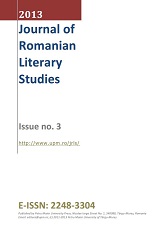
The article seeks to clarify the main features of the Romanian post-war literature in terms of its relationship with the Communist authorities and their directives. Thus, one can distinguish between a type of literature that turns into propaganda and a type of literature that attempts to circumvent the political and preserve individual values such as: memory, personal histories, Self-culture. The article also drafts the biography of the Post-Communist Romanian literature, focusing on the deep felt need to reorganize its status, vision and themes.
More...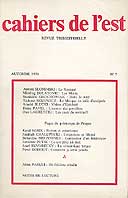
Keywords: Witold Gobrowicz; Mircea Eliade; Pierre Daix;
Reviews of: * Gobrowicz, Witold, Trans-Atlantique et Journal (1957-1960), Denoël, Les Lettres Nouvelles, by Cella Minart * Eliade, Mircea, Histoiore des Croyances et des Idées religieuses, Ed. Payot, 1976, by Sanda Stoloyan * Daix, Pierre, Le Socialisme du Silence, Editions du Seuil, 1976, by Serban Cristovici
More...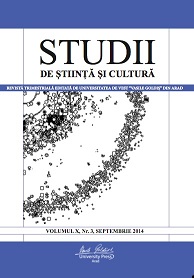
Keywords: Contemporary Spanish Theatre, Body. Performance, Théâtre contemporain espagnol, Corps, Teatru contemporan spaniol. Angélica Liddell. Corp. Performaţă
In plays which deal with individual and collective pain, it is primarily the omnipresence of a trivial body which is disturbing. That of a performer, author and director of creations which are close to the performance. This envelope of flesh and blood that has become unbearable, has suffered exhaustion and self mutilation and secretes repugnant substances all over the boards. A tool or a medium of this aesthetic violence, this impulsive animalistic body can follow either a spiritual or sacred path. As a figure of martyr or redemption, the body is given, sacrificed in a ritual with every performance. The « Atra Bilis » company presents to us a highly political drama where the body reveals our relationship with Society and concretizes our refusal of established conventions.
More...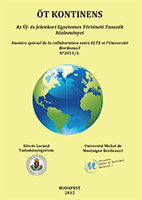
Keywords: Communist Czechoslovakia; Nationalized Cinematography; Communist Ideology and Propaganda; Otakar Vávra; Hussite Movement; "Hussite Trilogy"
The historical films became the important tools of the Communist propaganda and strengthen the position of the Communiste Party. In the years 1954 - 1956 the Czech director Otakar Vávra presented in his grandiose and very expensive movies, so called "Hussite Trilogy", to the fascinated people not only the picture of the national heroes fighting against "German aggressors" from the 15th century (obvious analogy with the struggle against Germans during the Second World War), but, at the same time and mainly, the fact that the Czech and Slovak "common (or ordinary) people", the predecessors of the future Communists, raised up against the German aristocratcy and against the corrupted Catholic Church already many centuries ago. His works are, according to many experts, the best example of the Communist propaganda in the big screen during the first phase of the Communiste rule in this country.
More...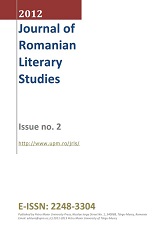
The article “The Post-War Romanian Literature" seeks to clarify the main features of the Romanian post-war literature in terms of its relationship with the Communist authorities and their directives. Thus, one can distinguish between a type of literature that turns into propaganda and a type of literature that attempts to circumvent the political and preserve individual values such as: memory, personal histories, Self-culture. The article also drafts the biography of the Post-Communist Romanian literature, focusing on the deep felt need to reorganize its status, vision and themes.
More...Părinţi duhovnici români contemporani. La începutul secolului XX, după primul război mondial, monahismul românesc cunoaste o miscare de înnoire si de crestere a vocaţiilor faţă de spiritualitatea isihastă, prin redescoperirea rugăciunii lui Iisus si a Filocaliei, proces favorizat de traducerea primelor patru volume ale Filocaliei românesti de Părintele Dumitru Stăniloae la Sibiu, între 1946 – 1948. Acest reviriment duhovnicesc se datora însă si impactului spiritual al miscării „Rugul Aprins” din jurul Mănăstirii Antim din Bucuresti unde un grup de importanţi intelectuali si monahi români având în centru figura poetului si jurnalistului Sandu Tudor (1896 – 1960), devenit monahul Agaton si ulterior schimonahul Daniil, aflaţi în căutarea rugăciunii lui Iisus si a experienţei isihaste îl vor întâlni pe Părintele Ioan Kulîghin (n. 1885), refugiat între 1943 – 1946 din Rusia la Mănăstirea Cernica de lângă Bucuresti si sub îndrumarea acestuia se vor iniţia în practica isihastă, ajutaţi de textele din cele două volume ale Sbornik-ului de la Valaamo. Părintele Ioan va fi arestat de trupele sovietice în 1947 si va fi deportat apoi în Siberia, iar Părintele Daniil se va retrage în Moldova, la Schitul Rarău, de unde va fi arestat în 1958 si condamnat de comunisti alături de ceilalţi membrii ai grupului de la Antim, mulţi dintre ei murind ca mărturisitori în fioroasele închisori ale sistemului concentraŃionar comunist din România. În perioada regimului totalitar marea lovitură dată monahismului românesc a venit în 1959 printr-un decret de stat si un nou regulament care a desfinţat o serie întreagă de comunităţi monahale, obligând pe călugării sub 50 de ani să părăsească mănăstirile ani de zile. Asezămintele erau destinate să devină aziluri de bătrâni, cooperative de producţie, muzee sau puncte turistice. În 1968 represiunea s-a diminuat si o parte importantă dintre călugări s-au putut reîntoarce la vetrele lor monahale. În perioada de liberalizare din primii ani ai dictaturii lui Ceausescu mănăstirile au beneficiat de o relativă toleranţă. Părintelui Dumitru Stăniloae i s-a permis între anii 1975 – 1981, publicarea volumelor 5 – 10 ale Filocaliei românesti, iar Arhim. Ioanichie Bălan din Mănăstrea Sihăstria a reusit să publice între 1980 – 1988 monumentala sa trilogie închinată monahimului românesc. La căderea comunismului în 1989, monahismul românesc se afla, paradoxal, într-o situaţie relativ înfloritoare, grupat în jurul a câtorva mari părinţi duhovnicesti care supravieţuiseră persecuţiilor, fiind cercetaţi în fiecare an de sute de mii de credinciosi. La loc de frunte se aflau două mari figuri de „stareţi” celebri din Mănăstirea Sihăstria, precum Paisie Olaru (1987 – 1990), „veritabil Serafim din Sarov român” si Cleopa Ilie (1912 – 1998) „adevărat avvă Pimen si patriarh neîncoronat al monahismului românesc”, după cum îi numeste cunoscutul teolog Ioan I. Ică jr. de la Sibiu. Acesti mari părinţi duhovnicesti împreună cu alţ
More...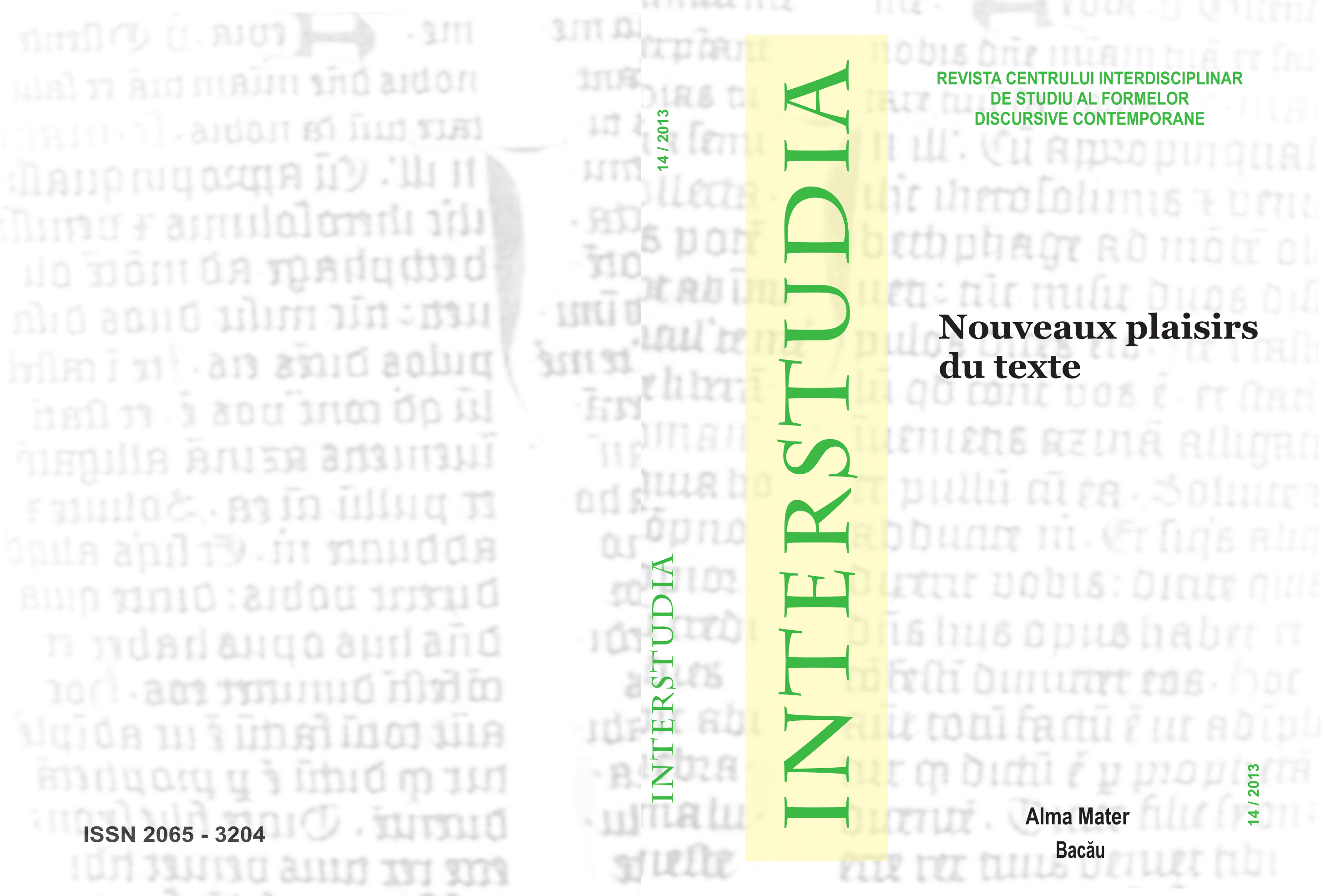
Keywords: science-fiction; récit; image; sense of wonder; fiction.
La science-fiction a souvent été considérée comme une littérature d’idées. Ce discours qui visait à revaloriser une littérature sous-estimée par la critique a eu son utilité historiquement mais il convient aujourd’hui de le dépasser pour réfléchir de manière plus profonde sur la nature de la science-fiction et sur son fonctionnement. Nous nous proposons de définir la science-fiction comme une littérature d’images dont le fonctionnement même repose sur les possibilités du récit. C’est ainsi comme conteurs que nous souhaiterions aborder quelques auteurs de science-fiction français qui, de manière diverse, travaillent la matière fictionnelle en mettant en valeur le récit. Au plaisir de l’auteur à déployer un système complexe au sein d’une narration répond le plaisir du lecteur de découvrir ce système et d’en sortir émerveillé ou étonné, heureuse victime d’un effet que les critiques anglo-saxons du genre ont appelé le « sense of wonder ». Par ce biais nous tenterons donc d’aborder quelques textes de Gérard Klein, Pierre Bordage et Ayerdhal et Jean-Claude Dunyach.
More...In dieser Rubrik wird auf aktuelle Publikationen hingewiesen, die für die Siebenbürgen-Forschung von Relevanz sind. Bei den alphabetisch aufgeführten Titelangaben handelt es sich um Neuzugänge der Siebenbürgischen Bibliothek (mit Angabe der Signatur jeweils in Klammern), nicht jedoch um eine Auflistung aller ihrer Neuerwerbungen; Neuzugänge, deren Titelaufnahme noch nicht abgeschlossen ist, sind hier nicht berücksichtigt. Diese Zusammenstellung erhebt in keiner Weise Anspruch auf Vollständigkeit. Für weiterführende Hinweise ist die Redaktion stets dankbar.
More...Keywords: exile, religion, freedom, rebirth, spiritual values
Vintilă Horia was one of the most famous Romanian writers of the 20th century. He had to spend most part of his life in exile, craving for his native country. The common theme of his novels is the condition of the exiled man, the sufferings and difficulties he undergoes when he encounters a different cultural space. The writer dreams about a better world where compassion and love can defeat the evil. He also believes that knowledge has an enormous power in changing the world. Both science and literature are ways which can help the people in building a better society. Vintilă Horia thinks that all spiritual values have always improved the condition of mankind.
More...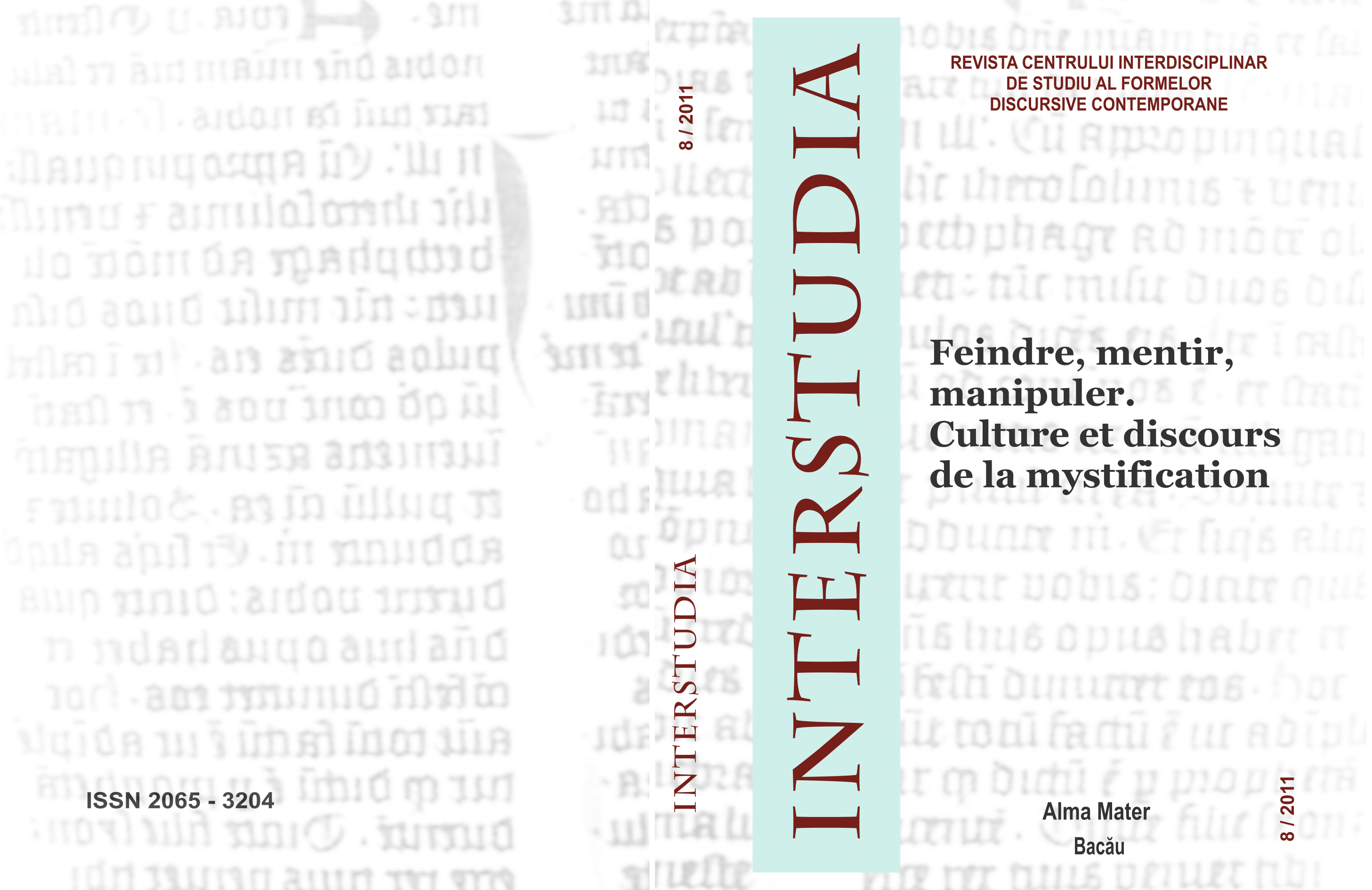
Keywords: théâtre élisabéthain; déguisements; mensonges; perversité; trahisons
Le théâtre élisabéthain offre un large panel de personnages et de situations mettant en scène des trahisons ou des feintes visant à servir les intérêts personnels du manipulateur ainsi que son plaisir purement pervers (cf. la ruse de Aaron dans Titus Andronicus de W. Shakespeare, qui obtient de Titus qu’il se coupe la main droite sans rendre à ce dernier les vies de ses fils – tout cela est manigancé par plaisir et sans aucun profit). La supercherie peut également être utilisée pour assouvir la vengeance et certains des scénarios les plus sanglants et horribles sont emprunts du cannibalisme du mythe d’Atrée et Thyeste. La feinte de Barabas dans le Juif de Malte de Ch. Marlowe, qui fait de sa fille une religieuse catholique pour sauver ses richesses, le mène à la perte de sa fortune, de sa fille – qui se convertit réellement – et de sa vie. Quant au déguisement de la fille de Shylock Jessica, il lui permet d’échapper à la maison parentale, ce qui accomplit la chute du marchand Juif. Difficile donc d’énumérer tous les mensonges, intrigues ou autres déguisements et manipulations dont regorge le théâtre élisabéthain. Les dramaturges de l’époque peignent un tableau très varié de différentes bassesses humaines, de leurs réussites ou de leurs échecs, mais tout cela dans le but de montrer que les limites entre le réel et la feinte – l’anti-réel mensonger – sont infiniment minces. La vie n’est pas seulement un songe, c’est aussi le mensonge et la feinte.
More...Book Review
More...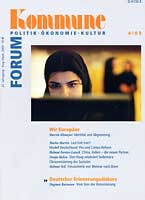
Keywords: Ethnonationalism in Serbia;
Today Ankara makes the impression to be more "European" than Belgrade. But what does this marginal position of Serbia really consist of? The author's thesis: the collective authoritarism of real socialism through the Milosvic system has been transformed in ethnonationalism. This anit-Western attitude nowadays is the common attribute of both the reactonary forces in the Serbian society and the restrengthened Orthodox church. --------------------------------------------------- Heute scheint Ankara europäischer zu sein als Belgrad. Was aber macht diese "serbische Randlage" aus, fragt unser Autor. Seine These: Der kollektive Autoritarismus des Realsozialismus hat durch das System Milosevic eine Transformation zum Ethnonationalismus erfahren; diese antiwestliche Fahne halten heute reaktionäre Kräfte und die wieder erstarkte orthodoxe Kirche hoch.
More...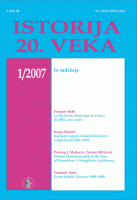
Keywords: research; France;
Depuis un demi-siècle la recherche historique a connu une profonde mutation, une diversification et un élargissement de ses champs. Cette évolution doit être mise en rapport avec le mouvement des idées, le fonctionnement du système universitaire, les nouvelles techniques de communication, sans oublier la demande sociale à laquelle les historiens se doivent d’être attentifs. Dresser un panorama de cette recherche, en dessiner les grandes orientations, en relever les principaux acteurs (1), tel est l’objectif de cet article.
More...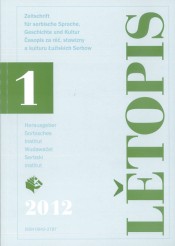
Keywords: Sorbian literature; Mein Stück Zeit; Ohne Pass und Zoll; Jurij Brezan;
Jurij Brězan was the most important Sorbian writer of the 20th Century, who was known above all for his novels, a genre which before 1945 hardly existed in Sorbian literature. Despite his view that his most important task was the preservation of the Sorbian language and identity, he was a significant literary figure at national level in the GDR. His two most im-portant autobiographical works, Mein Stück Zeit (1989, 2nd edition 1998) and Ohne Pass und Zoll (1999) illustrate the dilemmas of a socialist writer caught between politics and writing in the GDR who in the end gave up his belief in the power of literature to have a direct influence on politics.
More...Keywords: religious education; Byzantine education; virtues; plurality of religions; educational models
A short consideration regarding the byzantine educational model. The concept of theological education has a complex content, hierarchically arranged, which is to aquire dominant virtues. It is distinguished clearly as a formative content covering multiple areas such as cognitive, relational and social, emotional and personal development plus side information. Recovering the historical line of educational models appears as a necessity because of the pressure from multiconfesionality or the plurality of religions.
More...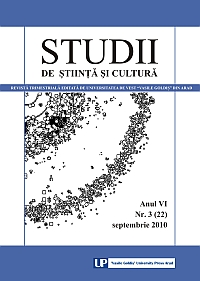
Keywords: Ioan Flora; identity; intertextuality; postmodernism; syntax; Ioan Flora; identitate; intertextualitate; postmodernism; sintaxă
Existential and stylistic liminality explains, with respect to the Romanian poet from the Serbian Banat, the atypical nature of his poetics. As a minority representative in Serbia and an outsider in Romania, Flora has “enjoyed” rather some global and complaisant labelling than really pertinent analyses. Although he belongs, biologically, to the ‘80s generation, his welltempered postmodernism, cohabitating with neomodernism, deserves special attention. This is precisely the aim of this article, which will be centred on three defining coordinates: (a) the text “document” and the poetics of the real; (b) intertextuality: relational identity and mythical symbols; (c) the rhetoric of discourse: tropes, syntax, metadiscourse.
More...